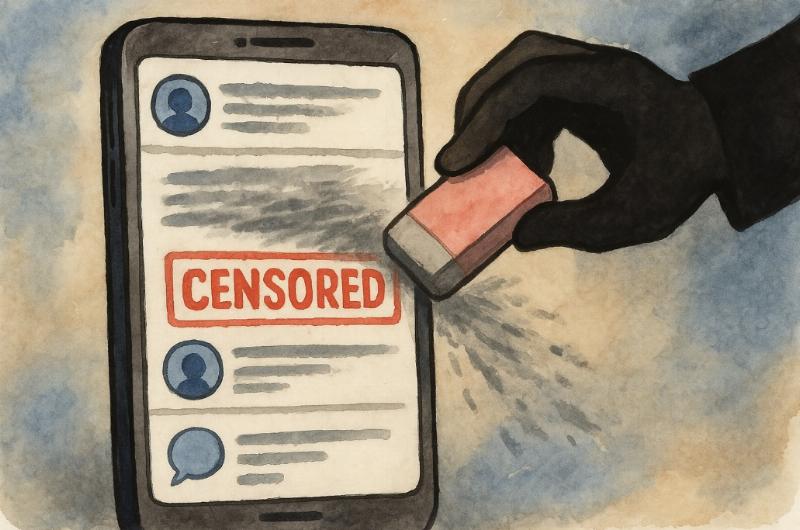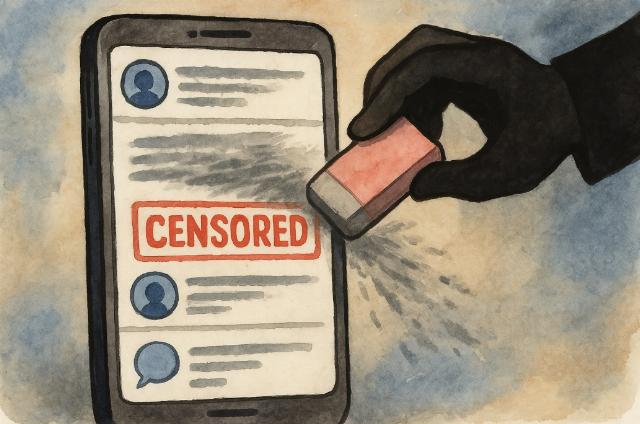


In light of recent disclosures from Google and Meta adding to the existing evidence, Americans must confront a sobering question: Was the 2020 presidential election truly free and fair? Not merely in terms of ballot security, voter access, or “voter fraud,” but in the deeper democratic sense—where citizens are entitled to hear competing viewpoints, weigh evidence, and make informed decisions without interference or deception.
Last year, under pressure from Jim Jordan, chair of the House Judiciary Committee, who was investigating government influence over social media platforms, Facebook admitted to yielding to pressure from the Biden administration and censoring conservative voices. That censorship, which Zuckerberg now claims to regret, included moderation decisions around election-related content, including the Hunter Biden laptop story.

Image created using AI.
As of last week, we now know that Google, also censored thousands of conservative voices—including influential commentators like Dan Bongino (radio host and former Secret Service agent), Sebastian Gorka (former White House counterterrorism adviser), Steve Bannon (host of “War Room” and former Trump strategist), Candace Owens (author and political commentator known for her critiques of COVID and race narratives), Dr. Simone Gold (founder of America’s Frontline Doctors and vocal critic of vaccine mandates), Liz Wheeler (former OANN host focused on cultural and policy analysis), and Kristi Leigh (independent journalist and former news anchor who covered election and pandemic dissent).
These weren’t fringe accounts violating platform norms with extremist language; they were prominent figures discussing COVID policy, election integrity, and the Hunter Biden laptop story—topics that turned out to be far more legitimate than legacy media initially claimed. Their combined audiences were in the tens of millions (see here, here, and here).
But the censorship is only half the story. The other half—arguably more corrosive—is the self-serving deception. For years, Google and Facebook denied that they were suppressing conservative content. They insisted their moderation was neutral, their algorithms apolitical, their fact-checking objective.
In his 2018 congressional testimony, Facebook CEO Mark Zuckerberg assured us,
I understand where this concern is coming from because Facebook and the tech industry are located in Silicon Valley, which is an extremely left-leaning place. But I want to assure you that we do not favor one viewpoint over another.
It wasn’t the only time he vehemently denied Facebook censorship. Google likewise denied engaging in censorship, with CEO Sundar Pichai telling Congress,
We approach our work without political bias. We build platforms to empower users and provide access to information.
These denials were repeated not only in congressional hearings but also in press releases and public statements. Now, under subpoena and scrutiny, the executives admit what many of us suspected all along: they censored lawful speech and misled the public about it. Further, they did so, not because of company standards, but explicitly because of political views.
There is an additional question that was not put to them in the congressional hearings: Why didn’t you admit at the time that you were engaging in this censorship? The answer is obvious. It is precisely because they wanted to maintain the influential power and prestige of being seen as fair and impartial providers of news and information.
The Hunter Biden laptop, dismissed in 2020 as “Russian disinformation,” has since been authenticated by multiple outlets. Aside from revealing Hunter’s sordid lifestyle, its contents raise serious questions about the Biden family’s business dealings, particularly with Chinese entities. Yet voters were told—by tech platforms, fact-checkers, and intelligence officials—that the story was fake. Twitter locked the New York Post’s account. Facebook throttled the story’s reach. Google buried search results and YouTube videos. All of this happened in the critical weeks before the election.
It wasn’t just tech platforms. Fifty-one former intelligence officials signed a letter suggesting the laptop bore “all the hallmarks of Russian disinformation.” That letter was widely cited by media outlets and used to justify censorship across platforms. We now know that some of those signatories—including former CIA Deputy Director Michael Morell—admitted under oath that they knew the laptop was likely authentic but signed anyway to help Joe Biden politically. This wasn’t a misjudgment. It was a coordinated effort to mislead the public at a decisive moment.
Two separate post-election studies showed that voters would have been significantly influenced by knowing the truth about the laptop in November of 2020. The Technometric Institute of Policy and Politics found that 71% of Democrats said they would have reconsidered their vote. McLaughlin & Associates found that 16% of Biden voters would have changed their vote.
This was beyond mere bias or politics as usual. It was an unprecedented asymmetric information warfare involving both our government and the biggest tech platforms on the planet. When one side of the political spectrum is algorithmically suppressed, demonetized, and banned—while the other is amplified—voters are no longer operating in a free marketplace of ideas. They’re being nudged, curated, manipulated, and deceived.
The scale of that manipulation and deception is massive. Facebook alone influenced the news exposure of over 1.3 million U.S. adults daily during the 2020 election, acting as one of the largest external referral sources to news publishers. This effect was, of course, amplified and multiplied through post-sharing. Google, which processes over 8.5 billion searches per day, controls the visibility of virtually every news story, video, and political query. These platforms don’t just reflect public opinion—they shape it.
Mainstream media outlets also played a decisive role. A study by the Media Research Center found that 92.2% of evening news coverage about Donald Trump on ABC, NBC, and CBS was negative during the final stretch of his presidency—compared to 59% positive coverage for President Biden during the same period. This imbalance wasn’t just editorial slant; it was a systemic framing of one candidate as radical and dangerous and the other as status quo and benign, regardless of policy substance.
Some might argue this isn’t “fraud” because “the votes were the votes.” But there are many flavors of fraud beyond stuffing the ballot box.
In securities law, for example, companies and executives have been found guilty of fraud for withholding information that may seem trivial on the surface but is considered “material” under the law—meaning it could influence a reasonable investor’s decision. Courts have ruled that things like failing to disclose the precise timing of revenue recognition, the health status of a key executive, preliminary involvement in litigation, or even internal dissent among senior officers on a company decision can constitute fraud. And rightfully so, as these concealments and omissions could distort the decision-making for thousands of individual and institutional investors.
This begs an obvious question: If the United States were a corporation and its voters the shareholders, how could the information withheld from them in 2020 be considered anything less than fraud? Concealing evidence that a chief executive and his son had been peddling influence internationally, lining their pockets with millions of dollars from foreign entities for years? Muzzling some of the most influential voices and arguments in support of one candidate’s ideas and strategies, while proactively promoting those of another? Enlisting former intelligence officials to knowingly mislead the public about a scandal concerning a chief executive? Indeed, if any of this had happened in the corporate world, would there not be people in jail?
Voters were lied to. They were bombarded with falsehoods and steered toward predetermined conclusions—denied the unbiased information needed to think for themselves. That’s not democracy. That’s propaganda—and it was executed with intent by the most powerful information gatekeepers in the world. Taking into account all of the evidence, which of these claims now seems more like hyperbole:
– That the 2020 election was unfairly—and perhaps illegally—influenced,
– Or that it was free, fair, and legitimate?”
Greg Salsbury, Ph.D. is former president of Western Colorado University and Board of Advisor member for STARRS.US. He earned his Ph.D. in Communication from the University of Southern California, and an M.A. from the Annenberg School for Communication and Journalism at USC.
